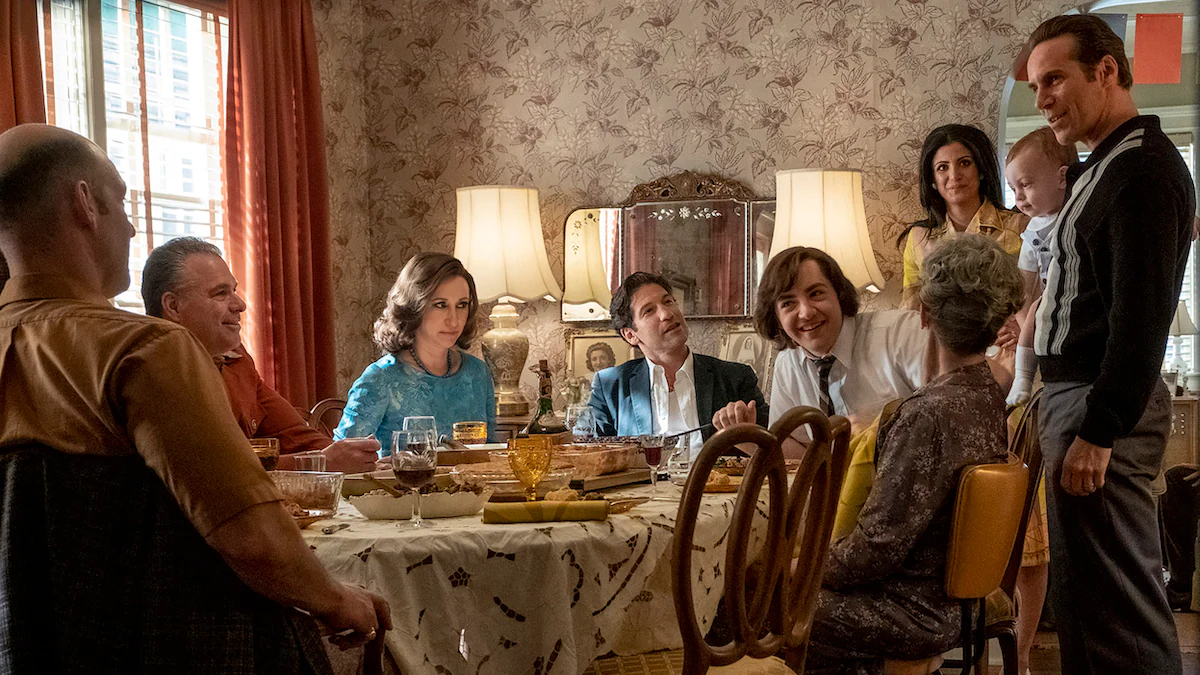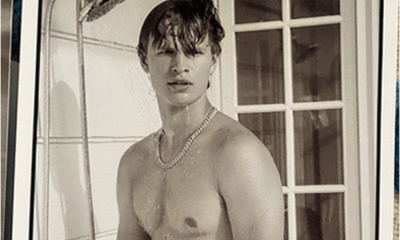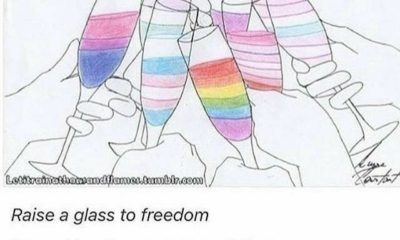UPDATE: While we were finishing up this plea for a Season 2 — it was announced by the creators! Fantastic news!
If you were around for “UnREAL” in its very first episodes, or “Mr. Robot,” back in their first seasons before the buzz hit, you’ll know the feeling: Something marvelous is happening, and nobody seems to care!
Like those shows, TNT’s “Good Behavior” is an ambitious twist away from the brand: Lifetime and USA both launched their flagship shows two years ago in an attempt to revitalize and expand the brand, and while their second seasons were more divisive and the rebranding has had variable results, we applaud the impulse.
And also like those shows, “Good Behavior” is a deeply personal, revolutionary approach to the classic one-hour drama. A mix of Elmore Leonard grit, “Rectify’s” yearning for redemption, “Hap & Leonard’s” dark humor, and the intensely deep portraiture of a “Mad Men” or “The Killing,” it’s a story of tiny lives of great consequence: An autobiography of passion, a study in human demonology, and a left-field take on morality that kept our heads spinning week in and week out.
Where the show differs — and succeeds — is in its powerful smallness.
Both shows above redrew the lines in terms of scope — “UnREAL” has its multimillion-dollar deals and a cast of thousands; “Mr. Robot” went ahead and ended the world and could possibly expand its story to the multiverse of diverging timelines — while “Good Behavior” is a story told in parking lots, gas station bathrooms, trailer parks and dingy law offices. Early promo may have given the impression of a globe-trotting “Ocean’s 11,” “Catch” or even “Alias,” with all those wigs — but the truth is so much scrappier and intimate.
RELATED: Sweet/nasty ‘Good Behavior’ rewards the only good parole officer on TV
While the ensemble is of course fantastic — Terry Kinney, Juan Diego Botto and Nyles Steele as the men in her life are particularly crucial — the story and series rest on the shoulders of Michelle Dockery’s Letty Raines.
A junkie and just-released inmate, Letty is an adrenaline addict who equates the thrill of her cat burglary with the high of meth and drinking that put her inside and continually wrecks her life: To her, putting on another persona and getting away with stuff is not only a better high, it’s a safer one.
But these twinned impulses have no place in the life of a mother on probation who is trying to get her son back: Jacob (Steele) is in her mother’s (the magnetic Lusia Strus) care, and she’s under a restraining order until she can prove her own stability. Over the course of the season, we saw Letty war with her darkness on a level that was neither epic nor sympathetic — simply biographical. Only Letty’s own highly verbal intelligence and independence keep the whole thing from falling under its own dark weight, as every move she makes and joke she cracks (often at extremely dark and/or dangerous times) is calculated to keep us in love with her, completely on her side, and hoping for the best.
It’s a story most of us know, from experiences with addiction in one form or another, but given the cast of people who hope for her redemption — and know enough to keep her at arms length — we often feel all alone with her in her struggles. It all adds up to make the theft, murder, abrupt drug binges — and occasionally the bizarre, for-its-own-sake, mind games — not a character study at objective remove, but directly accessible. Heartbreaking, funny… And almost always, we watch with a shout of revolutionary chaos right along with Letty, even when we know the consequences will be terrible.
Because the thing about Letty is: So does she. The worst stuff she pulls, we’re somehow led to understand and even approve, in a way that’s most like “Homeland’s” early Carrie Mathison — not a “Breaking Bad” antihero, but a profoundly broken, genius intellect coping the best that she can, with a sucker hand.
RELATED: Showrunner Chad Hodge on ‘Good Behavior’s’ stylish, murky, sexy drama
When James Bond cuts his swath of destruction through the world, picking up babes that aren’t more than gun-supplying bodies and tragic women in refrigerators, we stay with Bond. But when Letty does the same, it’s the men around her that could so easily be furniture in her story. But Kinney’s saintly and hapless parole officer, Jacob’s biological father Sean (Todd Williams) and friend Kyle (Justin Bruening) are all just as messed up, in their own ways: And just as human as Letty, or anyone else. It’s an insightful, emotionally far-ranging eye the show casts on everyone in its orbit, which means no matter what she gets into, she’s surrounded by folks who are as fascinating as she is.
Looking back, we can see how the season led up to its game-changing finale: Unlike most shows we can think of in recent history, and certainly off pay cable or streaming, it’s a true serial. Each episode of “Good Behavior” builds on the one before — and unlike some Showtime and Netflix shows, the episodes actually have tonal and intentional continuity. So many times in a high-octane series like this, each episode can be its own little movie, ignoring clues and hints dropped in episodes previous, adding up to a season that’s more than the sum of its parts. But it’s to the show’s creators’ credit that the ten-hour story of Letty Raines getting her son back… Feels like it.
In its first act, the season introduced us to Javier (Botto), a seeming Christian Grey-style abuser, who kidnaps Letty and then — in shades of Purple Man from “Jessica Jones” — forces her to act as his compatriot and wife as he goes about his contract killings. But as the season unfolded, and our understanding — and Letty’s — of the man behind the gun, his reasons for his acts, and his complete frustration when she won’t play along, underwent a huge shift.
What could have been a sad or sick story of Stockholm Syndrome, as Letty and Javier find their way to each other, becomes instead recognition between two souls who, for reasons we can only grasp slowly, are mirror images to each other: They both slip into and out of other identities with ease, they’re both able to commit their crimes due to deeply held mythologies about their own worth, and ultimately are more comfortable fighting (brutally, viciously at times) than admitting the other person may have the emotional upper hand as they fall in love.
For those of us used to more formulaic or procedural product, especially from the TNT’s of the world, it was just as much as shock to find them estranged by the fourth episode, as Javier gamely “lets her go” and she flounders for a few episodes in her hometown, before summoning Javier back to her like a demon lover — or guardian angel. When they’re reunited for the rest of the story, we’re as relieved as they are — and by putting us through that same wringer, all worries about the implications of their relationship and its future are laid to rest.
Letty never does anything without wanting to — sometimes at the end of a gun, maybe, but often not even then — and it’s Javier’s realization about this dangerous compulsion that puts the rest of her into perspective for him, beautifully, and thus him for us: We may have adored Javier as a villain and light-kink dom, but as a frankly great boyfriend and long-suffering accomplice to Letty’s feral wildness, it’s easy to fall in love with him just as Letty is somehow finding the grace to do so, too.
RELATED: ‘Good Behavior’ showrunner on Season 2 likelihood & what to expect
Letty’s journey toward redemption is as unlikely as anything could be, for such a singular and powerful square peg: Singing “Blue Skies” in a hotel restaurant while Javier’s chasing a dude around on the golf course, shopping while he’s doing murders in the mall parking lot, counseling a friend through his incredibly traumatic bisexual crisis, lovingly putting her parole officer free on the road to total chaos, and finally standing up to a South American drug lord — calling him a bad father to his hitman son, during the most uncomfortable family dinner you have ever seen — every step toward the light could easily be, on a different kind of show, the path into total darkness.
The intense and shifting power dynamic between the couple — and between Letty and her son, Letty and her mother, Letty and Sean, Letty and the universe — puts its particular quirky spin and brilliance on every twist, no matter how jaw-dropping or low-key. A slap-fight at a high school reunion is equal to a three-way gunfight in a suburban bathroom is equal to the painful troughs in Letty’s relationship with her son, under blanket forts or while trying to rescue him from grocery-store “jail” in the season’s most touching, hilarious episode…
The stakes don’t change, because the stakes are always: How do we preserve this remarkable woman, with all her natural gifts and hard-won skills, long enough for her to find a way to live? A dismissive look from her young son endangers that precarity — and thus, her survival — no more or less than a cartel’s gunman, shady hotel money launderers, or the entire FBI.
It’s the brilliance of the show’s low-scale, high-stakes approach that creates this world for us to live in, but it also points up the best things about Letty: The absolute and radical purity of her compulsively shades-of-gray, adrenaline-junkie approach to life — as explicitly related in the the finale’s most touching moment, a conversation between her son and soulmate:
Jacob: “Do you trust her?”
Javier: “I do trust her.”
Jacob: “Even though she’s not always honest?”
Javier: “She is always honest… I don’t mean with words, words are easy.”
Jacob: “Then what is she honest with?”
Javier: “With her actions. The way she lives her life.”
Javi goes on — in a final tearjerking move — to quote Emerson, whose words specifically describe her both for him and for us:
“Your genuine action will explain itself, and will explain your other genuine actions. Your conformity explains nothing.”
A deceptively simple conversation that sums up exactly why this show can only exist now, in this form — and with this actress: Blake Crouch’s beloved Letty Dobesh, brought to the screen as Letty Raines by Dockery and showrunner Chad Hodge, is a force of nature, and honestly one of our great 2017 heroes, and we’ll be rewatching the season from the start before the month is out.
From one life-changing hotel room encounter to another, from one emotionally charged elevator scene to the next, “Good Behavior” is more than worth the time to watch Season 1 even once — and we won’t sleep until we’re certain Season 2 has the green light.
Source link



 Movies News6 years ago
Movies News6 years ago


 Movies News4 years ago
Movies News4 years ago


 Movies News4 years ago
Movies News4 years ago


 Movies News4 years ago
Movies News4 years ago











